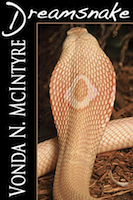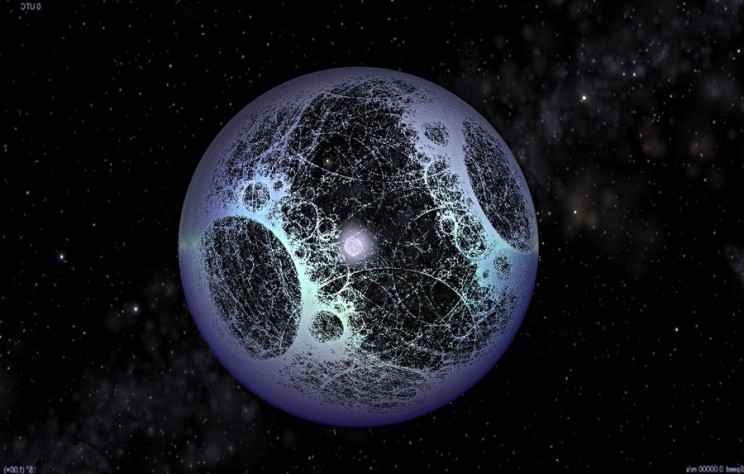Chain Mail is a telephone tag by email round-robin interview session with authors from the Book View Cafe writers collective. Images are links, connecting to biographical information about an author or more information on their current work. Additional information can be found on the contributors page.
Amazing Stories: Fantasy and science fiction used to be lumped together on the shelves. For several decades fantasy was largely considered the red-headed stepchild of the two. Currently, fantasy seems to be in the ascendancy. Is this a societal response to the uncertain world we live in? Is fantasy ‘dumber’ and therefore able to appeal to a wider audience? Or is it science fiction simply ‘harder’/scarier for most readers?
 PHYLLIS IRENE RADFORD
PHYLLIS IRENE RADFORD
All Science Fiction and Fantasy is Speculative Fiction, all exploring the “What if.” SF just works harder at finding a logical explanation for breaking the laws of physics with proximity to black holes, gene therapy, and aliens with super powers. Fantasy can always fall back on magic, demons, and dragons with super powers.
That Fantasy reader’s acceptance of things that cannot be caused SF readers to lift the corner of their lip in a slight sneer. They had the purer literature because it had science in the background. Have you watched Eureka lately? Certainly the scripts embed scientific sounding words into their gadgets and explanation, but unless you are a theoretical physicist on the cutting edge of research it’s all gobbledy gook that no one truly understands. Call the atomic metathesizer a magic wand and the computer program a spell in some ancient forgotten language, it’s all the same. But the stories are fun. That’s what makes them so popular. The fun.
Fantasy is fun even when presenting a doom and gloom scenario about character we have grown to love. We know it’s fantasy and we are willing to absorb the metaphors of socio/political conflict. Science Fiction can do that, when it wants to. I am not as well read in SF as I am Fantasy, probably because I immersed myself in the sub genre during a period when SF writers and readers took themselves much too seriously. I crawled out of the depressing murk of probable enslavement by corporations, or nuclear Armageddon, or artificially generated plagues that looked way too realistic and could happen to me. The dire circumstances leeched the energy from me to do anything about this probable future. I turned to stories about enslavement by evil emperors, natural disaster Armageddons, and plagues created by wizards with relief, recognizing the story and the need to do something now before the future happens for real.
Yes, Science Fiction is scary. Fantasy can be too. It’s the distance of metaphor and the fun factor that makes fantasy more appealing to me.
 VONDA MCINTYRE
VONDA MCINTYRE
It’s possible to write “dumb” sf just as it’s possible to write “dumb” fantasy. Smart, internally consistent, coherent sf and fantasy are much more satisfying to read and to write. And to watch, since we’re including TV and movies. One of the more irritating elements of Eureka is the fake science. Nobody, including rocket scientists, understands it, because it doesn’t make any sense. The other irritating element of Eureka is the plot, which is almost always “Crazy scientists do something stupid and thoughtless that will kill a favorite character/destroy Eureka/end the world; Sheriff Carter, because of his common sense, which is morally superior to being smart (even though he is not, in fact, stupid), solves the problem and saves his daughter/his lover/Eureka/the world.”
One similarity between good sf and fantasy is that the writer doesn’t change the rules in the middle of the game. With sf, you may decide to stay within the limits of reality as we know it, or you may decide to speculate and push the envelope or challenge a scientific theory on purpose (faster-than-light travel is a common choice). With fantasy, you make up the rules of your world, but you have to stick to them.
As Phyl points out, a major strength of both fantasy and sf is the ability to create thought experiments and explore the “What Ifs?”
 JUDITH TARR
JUDITH TARR
I’ve fought the “SF smart, Fantasy dumb” fight all the way from the trenches of the internet to the pages of AMAZING itself. My feelings can be expressed by the statement that science fiction is a subset of fantasy, and can we move on?
What I’d like to move on to is the other half of the question: Why is fantasy resurgent right now, and why does sf appear to be in a slump? Some of this I think is backlash against the goshwow SCIENCE!!!! of the early Space Age. Lots of things that we thought were amazing and fantastic and wonderful now turn out to have difficult consequences. Nuclear power, for example–in the Fifties people were treating bomb tests as entertainment. Now we’ve seen the less desirable results of that, and we’ve also seen Three Mile Island, Chernobyl, Fukushima. The happy child that science used to be is now a wary teenager–and that teenager is going through some difficult phases. The Creationism phase: let’s just deny it all and hide behind a millennia-old myth. The environmentalism phase: we’ve got to clean up our own room before we move out into the cosmos. The mom and dad cut off the credit card phase: sorry, kid, we need that money to pay the grocery bill.
And there’s also the rise of the internet. I’m not playing Blame The Internet here. I’m saying it’s profoundly changed how we approach each other and the world. In many ways that change is good. In some, not so much. The tropes of classic sf–robots, rocket ships, scientific triumphs and disasters–have all, in one way or another, become real. Even space exploration–it’s in a slump of its own, but it’s still alive and quietly evolving; it is moving on, though by no means at the pace our genre might have wanted.
What has moved on is the virtual world, and that world seems to gravitate toward a less scientific kind of fantasy. Remember Clarke’s Law? Any technology sufficiently advanced becomes indistinguishable from magic? In the virtual world, we’re there. We’re exploring deeper crannies of the human id, and also developing new ways of working and playing together as a species. Fantasy in the broad sense provides an idiom for dealing with this, and a metaphor that resonates with millennia of human evolution. Science as a metaphor is a late development, and science fiction is one of the youngest of all literary genres. It’s still alive, still has its followers–but like everything else, it’s evolving.
We may have moved on from robots and rocket ships, but we certainly are still asking “What If?” Will science fiction as a publishing category see a resurgence? Sure, if something happens to give a boost. At the rate planetary science is galloping on, for example, we could find actual alien life. And then if that catches the imagination of enough people, voila. Brand-new SF Golden Age.
 PATI NAGLE
PATI NAGLE
I agree with Judy about the relationship between fantasy and SF. Maybe there’s currently some backlash against science, but I also think SF has fewer readers right now in part because much of the SF written in the last two or three decades is not very accessible. Some of it is so sophisticated as to be opaque. Some is self-referential, a conversation that’s taking place among the core SF community. The casual reader who picks up a book to see if it’s interesting is not going to catch cross-references and associations that amuse those who are deep in SF culture. S/he won’t be entertained by that, and might even be confused by it. S/he loses interest, picks up the next book – “What’s this one about? Dragons? Cool!”
I’d love to see more new SF stories of the “Golden Age” type, where adventure is more important than sophistication. Those are the stories that capture the imaginations of young readers and inspire them to get into science.
 DAVE TROWBRIDGE
DAVE TROWBRIDGE
It seems to me that as a subset of fantasy, science fiction would naturally appeal to fewer readers. Perhaps the Golden Age of science fiction was simply a period when the zeitgeist of technological optimism made science the preferred magic wand of fantasy, and now we’ve returned to a more natural balance. And, it’s true, as Pati notes, that much of SF is self-referential, thus drawing on a smaller common set of archetypes and tropes, which would tend to limit its appeal compared to fantasy.
However, the Golden Age is still with us. The Exordium series that Sherwood Smith and I wrote (and are now reissuing in a revised second edition) was a conscious attempt at a retro Golden Age space opera with modern sensibilities, and we’re not stopping there. Other authors currently updating this venerable tradition—each in their own inimitable way—include R.M. Meluch, Matthew Hughes, and Charles Stross. Thanks to the Internet and the ebook, I look forward to seeing even more of both this and other subgenres of science fiction.
 SUE LANGE
SUE LANGE
I was going to pass on this one because most of what I was going to say has been said. But here’s a great illustration. Pati said this: “…much of the SF written in the last two or three decades is not very accessible. Some of it is so sophisticated as to be opaque.”
And then Dave mentioned Charles Stross. How accessible is his work to the average non-geek but gee whiz loving reader?
![]()
 LINDA NAGATA
LINDA NAGATA
I like the term “speculative fiction”—those stories not entirely grounded in the world as we know it—and there are wonderful books from one end of the spectrum to another. I do think Pati has a legitimate criticism when she talks about the accessibility of some SF, and it’s a criticism that can be made against some of my own work, but that’s not to say this type of story isn’t worth doing. There is an audience for books that assume a fairly high level of scientific literacy on the part of the reader, and I’m often impressed at how well these books sell. But it’s a niche market, and I do think these books can be harder to grasp and harder to get into for the unaccustomed reader than more general works. So what? We each read the books we like and most of us, I hope, read across a wide range. I do think that science fiction, with all its technological trappings, is still hugely popular—it just gets experienced via Mass Effect, Half Life, Metal Gear, etc., and less often via books than was once the case.
 MAYA KAATHRYN BOHNHOFF
MAYA KAATHRYN BOHNHOFF
I think when times are particularly scary, many of us gravitate more toward stories that can’t possibly come true. Fantasy fits that bill pretty nicely. SF is, by it’s very nature, more firmly grounded in the here and now and the real problems of society than fantasy has traditionally been.
To give a snapshot of what I mean: I started out as a writer of science fiction with about half a dozen stories in Analog before I wrote my first fantasy‚ (THE MERI). A friend of mine who was a romance writer read THE MERI and said, “I really liked it! I had no idea fantasy could be so philosophical. I thought it was just escapist fluff.” Three fantasy novels later, reviewers were telling me I wrote fantasy with rivets. I wrote in fantasy worlds, but tackled the problems of those worlds as if I were writing SF—inventing pragmatic magical gizmos and flipping Arthur C. Clarke’s dictum about science and magic 180 degrees.
So, there is a perceived dichotomy between the two genres: SF is pragmatic and fact-based; fantasy is a willow-the-wisp genre, airy fairy and with out limitations or rules. And this dichotomy exists in the minds of readers and writers as well. I can’t count the number of new writers I’ve heard say they liked the idea of writing fantasy because there were no rules to follow. Some fantasy writers, I’m sure, approach the genre as if that were true.
Okay, to be honest, I think maybe those would-be writers were admitting to laziness. And I can tell you that I do three times more research for a fantasy story than I do for an SF story because I have to make up most of the rules from whole cloth and then stick to them.
I find fantasy appealing, then, on two levels—it feeds a particular desire for fiction that “can’t happen here” and it’s also an opportunity to walk into the imagination of another writer and marvel at their ingenuity.
Bottom line: I think people read whatever feeds their particular joneses. They may want to contemplate real possibilities or they may want the real world to disappear while they refuel.
To be honest, I think the cycles we see in literary offerings in bookstores has less to do with what people want to read and more to do with what the industry wants to offer them. Most readers I know are far more omnivorous than most publishers imagine they are. I suspect that for any cadre of readers who crave sober, gloomy, challenging assessments of futuristic problems based on current trends, there is a group that are starved for sparkly vampires, clanking Victorian machinery and magical realms that thrive cheek by jowl with the “real” world.
Two things I think are true: just about everyone wishes they’d gone to Hogwarts or were going to ship out on the starship Enterprise.
 CHRIS DOLLEY
CHRIS DOLLEY
I think Maya was spot on when she said, ‘I think the cycles we see in literary offerings in bookstores has less to do with what people want to read and more to do with what the industry wants to offer them.’ Exactly. Publishing is a business and books have to make money. But choosing which book is going to make that money is often a lottery. Yes, there are authors whose name is practically a gaurantee of a bestseller. And there are the media tie-ins which, again, rarely fail. But… then there’s the rest. And having a great book does not always equate to financial success.
So publishers look for trends. Zombies are in, Vampires are out. But with lead times on books of one to two years, trends can come and go before the book is published. Or the trend may never have existed except in the eyes of a handful of editors.
One of the things I’ve noticed about the huge surge in independently published books is how well SF is doing. The major publishers may think it doesn’t sell, but there are thousands of new authors who want to write it, and hundreds of thousands of readers who want to read it.
 BRENDA CLOUGH
BRENDA CLOUGH
But there’s a larger cycle. There’s what we might call the Long Count – the long slow swell of literary fashion. The Spirit of the Age, maybe. Right now the Spirit is definitely enamored of fantasy. Fifty years ago, at the height of the golden age of SF, it was indeed SF: Asimov, Clarke. Another generation or so earlier, and fantasy ruled: Barsoom, Pellucidar. If we may say that the current Spirit started – what would folks say — with George Lucas and STAR WARS? Then get your fork: It’s about done. In another ten or fifteen years, it’ll be as over as the hobble skirt and fins on Chevys. SF’s time is coming. Again.
 DEBORAH J ROSS
DEBORAH J ROSS
I want to echo what Chris said. There are plenty of readers out there who adore science fiction, even the “difficult” stuff, and by and large, they’re comfortable with digital technology. Their numbers won’t create an instant New York Times Bestseller, but are certainly sufficient to make it worthwhile for writers who epublish and hence have extremely small expenses. I’m betting on the internet making those books and authors available to those readers.
My thought about the state of fantasy today is that it started out as much more narrow in scope. Think E. R. Eddison and Lord of the Rings. Then we had werewolves in London and elves in Manhattan, not to mention cross-overs to Young Adult and Romance and mystery. Much of what used to be labeled horror became “dark fantasy.” So now we have a hodge-podge catch-all that perhaps takes up a larger share of the market simply because it encompasses more sub-genres. What do you think?

KATHARINE ELISKA KIMBRIEL
I think that there’s truth to your suggestion, Deborah – we have a lot more sub-genres, so instead of picking up and reading the back of every SF or Fantasy novel out there, we receive more clues from covers whether a book is what we’re looking for. Maya’s comment both made me smile and grabbed my attention:
Two things I think are true: just about everyone wishes they’d gone to Hogwarts or were going to ship out on the starship Enterprise.
This is something I struggle to keep in front of my eyes when working on a story — the so-called “sense of wonder” that is at the core of what all SF and Fantasy writes appreciate, even if it’s not the first thing on their shopping list of “My Perfect SF (or Fantasy) Novel.” When we forget this, it may be that we are not writing SF or Fantasy. We can be writing a thriller, or a polemic, or a romance with magical trappings – but it’s not truly SF or Fantasy.
People who enjoy messing around with tarot (and like a lot of Fantasy writers, I’ve researched tarot, too!) would suggest that this is like the Wheel of Fortune – sometimes SF is in ascension and sometimes it’s Fantasy. Just wait, and the wheel will come around again. This doesn’t mean that the next SF wave will be SF the Golden Age Writers, or the New Age SF writers, or the Cyberpunk writers would recognize and embrace. But it will ask “What if?…” and it will have that kernel of wonder. Most of Book View Café’s writers have both these qualities in their SF and their Fantasy.
We still value and seek out those elements — even if NYC doesn’t choose to give them to us. I think that more than price is part of the resurgence of the SF backlist in ebook format. “What if?” and Sense of Wonder still lives!
Passes
Stay Tuned: Next:










